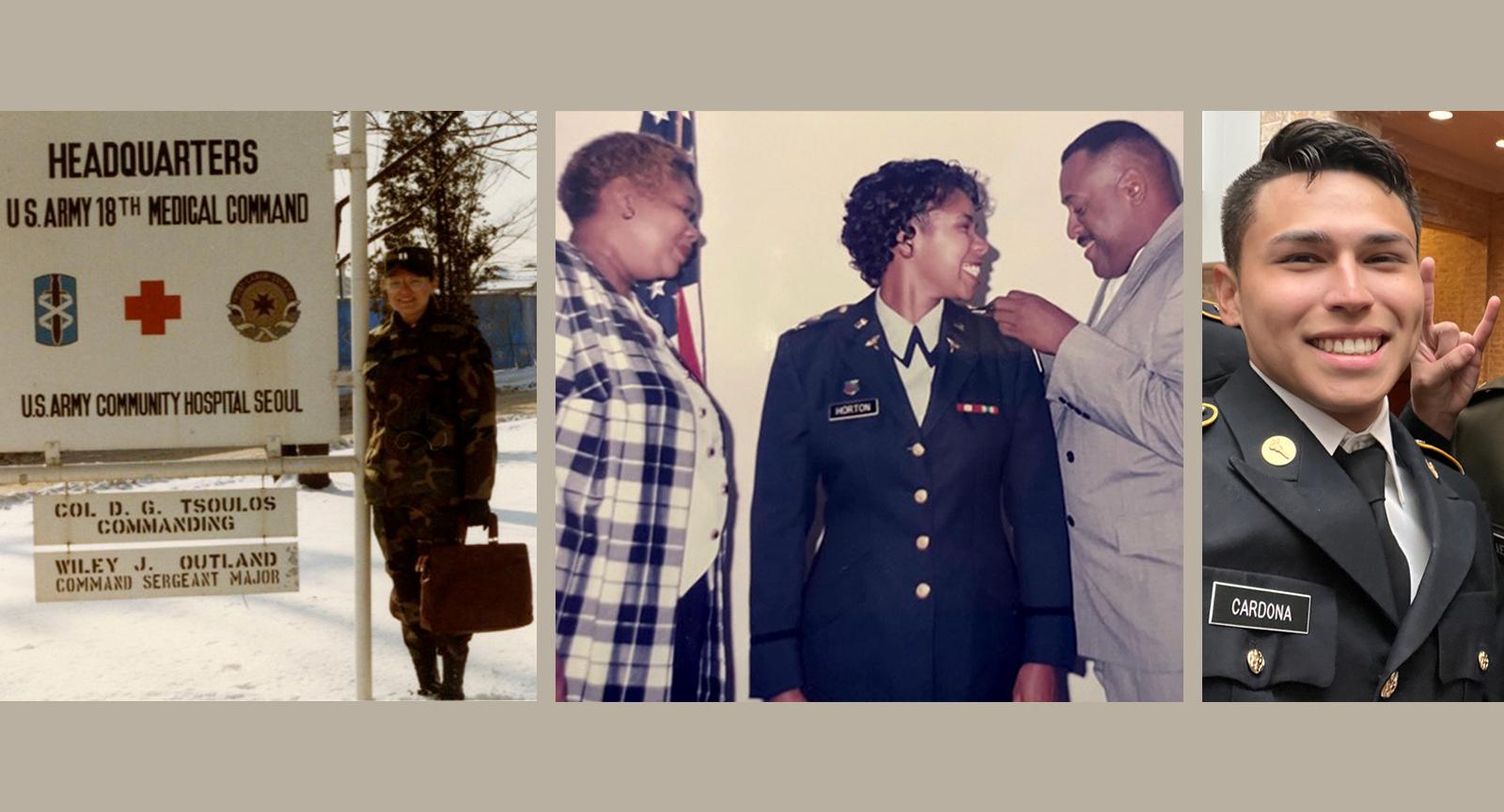
(Middle) Dr. Shalonda Horton attends a promotion ceremony, where her mom (Diane Brazzell) and dad (Jeff Brazzell) pinned her rank.
(Right) Omar Cardona attends the UT ROTC Military Ball.
The U.S. Army Nurse Corps (ANC) stands as a testament to the commitment of health care professionals who have dedicated themselves to serving their country. From the battlefields of war to the halls of military hospitals, Army nurses exemplify courage, compassion and strength in the face of adversity.
Established in 1901, the ANC has played a role in providing essential medical care to service members and their families. Its members are educated not only to deliver quality health care but also to navigate the unique challenges of military service.
At the heart of the ANC is a commitment to service, where individuals serve as military officers first and nurses second.
The School of Nursing counts two faculty members among the many exemplary individuals who have served in the ANC. Linda H. Yoder, PhD, MBA, RN, AOCN, FAAN, professor emeritus, and Shalonda Horton, PhD, MSN, RN, clinical assistant professor, stand out as examples of dedication and service.
Serving her country
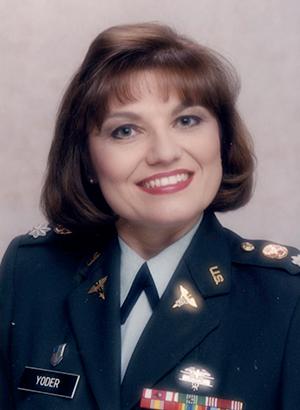
With a career in the ANC spanning decades, Yoder has made significant contributions to military nursing and health care. Born in Germany and raised in a military family, Yoder said her upbringing instilled in her an appreciation for service and sacrifice.
“I knew at a young age that I wanted to serve my country,” Yoder said. “Joining the ANC was a natural choice for me.” Yoder embarked on a path that would take her from the halls of nursing school to the front lines of patient care.
“At the heart of military nursing lies a journey of evolution and adaptation,” she said. “I started as a bedside nurse, caring for soldiers on the front lines. But as I advanced in rank, I found myself in managerial roles, overseeing not just patient care but also the strategic operations of military medical facilities.”
Yoder’s journey embodies the mission of the ANC: “To provide responsive, innovative, and evidenced-based nursing care integrated on the Army Medical Team to enhance readiness, preserve life and function, and promote health and wellness for all those entrusted to our care.”
“Service to country is the bedrock of military nursing,” she said.
Men were not allowed to join the ANC until 1955, and ever since, the Corps has been approximately 70 percent female, while some of the jobs within the go-to-war units were only open to males until recently. When Yoder was stationed in Italy, she found herself in a unique position, serving alongside a predominately male unit where she was often the only woman among hundreds of men. Despite this, she quickly earned the respect of her colleagues through her competence, strength and professionalism.
Her leadership abilities became evident as she rose through the ranks, assuming increasingly prominent roles within the ANC—retiring in September 2002 at the rank of colonel.
Her career in the ANC was marked by a pursuit of excellence and a commitment to lifelong learning. Driven by a passion for knowledge and a desire to expand her horizons, she pursued advanced degrees, earning her master’s and PhD while serving.
From innovative research in oncology to leading initiatives aimed at improving patient care outcomes, she has made an impactful legacy on military health care. She received the Phyllis J. Verhonick Award from the ANC in 1990 and 1992 for her contributions to nursing research. This honor is presented to an Army nurse who demonstrates excellence in research that significantly contributes to nursing and improves patient care outcomes.
Beyond her professional accomplishments, Yoder became a dedicated educator and mentor to nursing students and the next generation of military nurse leaders. “I wanted to pave the way for future generations of military nurses,” she said. “It was important to me to ensure that all nurses, regardless of their background, had equal opportunities to succeed.”
As she reflects on her years of service, Yoder remains humbled by the opportunities she was given and is grateful for the support she’s received. “I am deeply honored to have served alongside some of the finest men and women in uniform,” she said. “Together, we have faced adversity with courage and steadfastness, and I am proud of all that we have accomplished.”
A dual identity
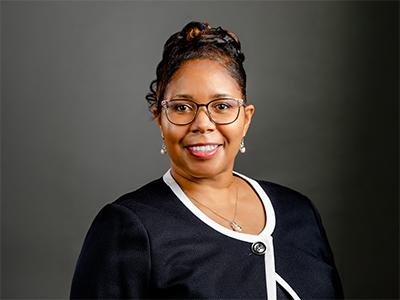
Shalonda Horton, PhD, MSN, RN, also shares a rich and varied career in the ANC. Raised in a family with a strong military tradition, Horton’s path into nursing was not a predetermined one. When she was a freshman in college, she initially wanted to become a doctor. Her best friend, who was a nursing student in the Reserve Officer’s Training Corps (ROTC), convinced Horton to give both a try.
“I loved my first nursing class,” Horton said. “I fell in love with it.” While in the ROTC program, she found not only a way to continue her education but also a sense of purpose and belonging.
After graduating, Horton served for a little over four years on active duty in the ANC and was stationed in locations across the globe, including Korea, that exposed her to a variety of challenges and experiences. “Just knowing that the world is bigger than you are and being able to collaborate with other people to take care of soldiers has been amazing,” she said.
She transitioned into the reserves in 2000 to pursue her education further. Despite considering leaving the Army at times, she was inspired to stay and realized the importance of nursing in various roles beyond the bedside.
Horton emphasized the significance of nursing leadership, teamwork and holistic care. She appreciated the opportunities for training and development in the Army, even though some aspects, like soldiering skills, were initially challenging for her. She highlighted the importance of the decision-making skills she developed in the ANC and how they translated to civilian life.
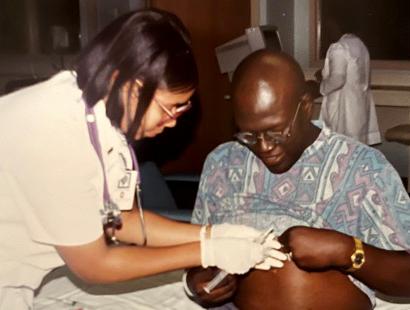
The transition between military nursing and civilian life has been a journey of discovery, filled with both challenges and opportunities. She retired in January 2021 from the Army Reserves as a Lieutenant Colonel.
“There’s definitely a bridge between the two worlds,” Horton said. “While the settings may be different, the core principles of nursing remain the same: compassion, competence and commitment to patient care.”
Based on her experiences in the military, Horton said the importance of adaptability and resilience in navigating the complexities of health care delivery are key for any nursing. “In the military, you learn to expect the unexpected and adapt to rapidly changing circumstances,” she added. “Those skills are invaluable, whether you’re working in a combat zone or a civilian hospital.”
Horton also shared that military nurses bring a unique perspective to their civilian colleagues and settings.
“We’ve seen it all,” she said. “From combat injuries to humanitarian missions, military nurses are exposed to a wide range of health care challenges that can inform and enrich their practice in civilian settings.”
Additionally, Horton has witnessed and experienced the importance of camaraderie and teamwork in both military and civilian nursing environments. “In the military, you rely on your teammates for support and solidarity,” she added. “That sense of camaraderie carries over into civilian nursing, where collaboration and mutual respect are essential for providing quality patient care.”
As Horton reflects on her dual identity as a military nurse and a civilian health care professional, she acknowledges the unique blend of skills and perspectives that define her role. “I carry the lessons of my military service with me wherever I go,” she said. “And I am grateful for the opportunity to continue serving others, whether in uniform or in scrubs.”
In her eyes, the connection between military nursing and civilian life runs deep and is rooted in a shared commitment to healing, compassion and service to others. “At the end of the day, it’s not about where you work or what uniform you wear, it’s about making a difference in the lives of those who need it most, wherever they may be,” she added.
Ultimately, Horton’s journey in the ANC is a testament to the transformative power of service, resilience and leadership. “I am who I am because of what I’ve gone through in the Army,” she said. “I am grateful for the experiences that have shaped me into the nurse and leader I am today.”
Horton’s advice to those considering a career in nursing or in the ANC is to embrace the opportunities for growth and development. “I tell them to really pause and make sure your heart is in it,” she said.
Bridging the gap
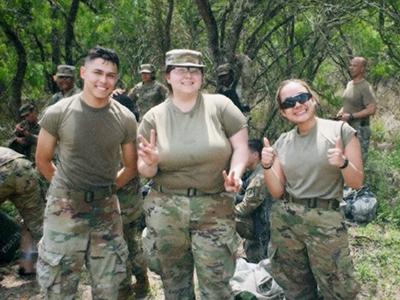
School of Nursing Master’s student Omar Cardona, BSN ‘22, who is currently in the UT Army Nurse ROTC program, decided to pursue a career in the ANC thanks to support from faculty and mentors, including Horton.
She encouraged Cardona to align his heart with his professional path. Her guidance helped him navigate the complexities of joining the ROTC while pursuing graduate studies.
The ROTC and the School of Nursing sponsor the Partnership in Nursing Education Program, which allows nursing students to enroll in the Army ROTC program and receive a degree in nursing and a commission as a 2nd Lieutenant in the ANC.
“I knew I wanted to challenge myself and serve my country in a different capacity,” Cardona said. “The ANC offered an opportunity to not only care for soldiers but also their families, a responsibility I felt compelled to undertake.”
Cardona was initially drawn to marketing, and his path shifted when he reflected on his innate desire to help others, nurtured by caring for his mother who has epilepsy. “Growing up, I took on the role of caregiver for my mom,” he said. “It was those experiences that made me realize my calling to nursing. I saw firsthand the impact that compassionate care can have on a patient and their family.”
Recognizing the nurse-related tasks he performed for his mother, he realized that nursing aligned more closely with his identity and aspirations. Inspired by the care his mother received, he aims to replicate that sense of value for his future patients and their families.
For Cardona, the essence of nursing lies in the connections built with patients, bringing smiles, laughter and a sense of personhood to their care. While his role in the ROTC presents physical challenges and demands, he values the growth opportunities and tight-knit community it offers.
As he prepares to transition into his role as an Army nurse, Cardona remains committed to lifelong learning and growth. “I’m excited about the opportunities for professional development and advancement that the Army offers,” he said. “Whether it’s pursuing further education or gaining specialized training, I’m eager to continue honing my skills as a nurse and leader.” Cardona looks forward to bridging the gap between military and civilian health care. “My goal is to ensure soldiers can focus on their duties, knowing their families are in capable hands,” he added.
With aspirations to teach and make a difference in nursing education, Cardona sees himself guiding future generations of nurses. “I hope to inspire and empower students to become compassionate caregivers and advocates for their patients,” he said.
Cardona expresses gratitude for the support and guidance he’s received along the way. “I’m thankful for the mentors, professors and fellow students who have believed in me and encouraged me to pursue my dreams,” he concluded. “Their guidance has been invaluable, and I’m excited to continue growing and serving others in my future endeavors.”